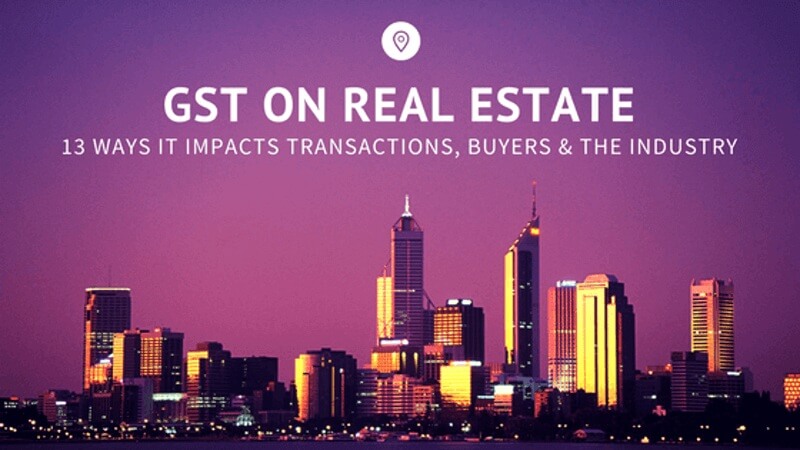
GST on Real Estate – 13 Ways It Impacts You
This post draws from the top real estate experts and online news sources on GST, and aims to be a quick primer on the impact of GST on real estate and its stakeholders – the sector, buyers, sellers, and developers, but is not meant to be a comprehensive authority on the topic.
The industry is still in wait and watch mode and it will be another 6-8 months post implementation to see any meaningful impact. In short, experts says it will have only a neutral effect on real estate.
Important Disclaimer: Although due care has been taken to publish only genuine and latest information, Chennai Dream Homes cannot be held responsible for the veracity of the information posted here, and any action taken as a result is at your own risk.

Part 1: GST on Real Estate – An Introduction:
The GST Bill was approved in the Lok Sabha on March 29, 2017 with four supplementary legislations –
- The Central GST Bill, 2017
- The Integrated GST Bill, 2017
- The GST (Compensation to States) Bill, 2017 and
- The Union Territory GST Bill, 2017
1. Intent of the GST
The GST will subsume central excise, service tax, VAT and other local levies to create a uniform market. GST is expected to boost GDP growth by about 2 per cent and check tax evasion.
2. Previous Real estate Transaction Tax Rates before GST:
Bengaluru Mumbai Pune Chennai Gurugram VAT 4.0% 1.0% 1.0% 2.0% 4.0% Service Tax 4.5% 4.5% 4.5% 4.5% 4.5% Stamp Duty 5.7% 5.0% 5.0% 7.0% 6.0% Registration Charges 1.0% 1.0% 1.0% 1.0% 0.5% Total Taxation 15.2% 11.5% 11.5% 14.5% 15.0%
Source: Industry, JM Financial
3. New Tax Rates – GST on Real Estate Transactions
The GST Council has recommended a four-tier tax structure – 5, 12, 18 and 28 percent.
Under revised order from the government, under-construction properties will be taxed at 18% which includes 9% SGST plus 9% CGST. The government has also allowed deduction of land value equivalent to one-third of the total amount charged by a developer, thus, making the effective tax rate as 12% . Athough, stamp duty and registration charges are currently kept outside the ambit of GST, soon these state levies are expected to be subsumed into GST.
Part 2: Impact of GST on Real Estate Sector

4. Impact by Construction Stage
Residential construction services, will invite GST at the rate of 12 per cent, which will apply to developers selling residential units before completion of construction to the home buyers. Nevertheless, stamp duty will continue to be applicable , irrespective of whether the property is under-construction or constructed, in the pre-GST and post-GST regime.
Another important factor that needs to be examined, is the stage of construction. If the project is at an advanced stage, where substantial cost has already been incurred before the application of the GST, very little input credit will be available to the developer and very less benefit will be passed on to the buyers. But if the project is at an early stage, more benefits can be passed on.
5. What happens to Resale properties and Land?
GST does not apply to completed projects or resale properties. So, the 12 per cent is not applicable here but just the stamp duty since there is no service tax or VAT on resale properties. Therefore, on a resale property, you anyway have the benefit of saving up to 9% which includes the approximate value of service tax and VAT taken together in case of an under-construction property. However, this is a simplistic assumption. The price of a resale property and an under-construction are anyway not the same. Where it is similar, buyers do have the benefit of saving some fraction.Similarly, sale of land and completed buildings will be out of the purview of GST.
6. Ready to Move In properties will be preferred
Realtors reckon that ready-to-move in properties would be preferred by homebuyers now as that segment remains out of the GST ambit. However, such properties are likely to cost a bit more now as these properties won’t get any benefit of input tax credit.
Part 3: GST on Real Estate – Impact on Home Buyers & Developers
7. Will Tax Burden on Home Buyers increase post GST?
The Tax burden on homebuyers in under-construction projects is not expected to increase in Goods and Services Tax (GST) regime: The general perception was that with the 12 per cent GST rate, the tax has gone up from 5.5 per cent (service tax plus VAT). But a lot of efficiencies have been brought in through GST.
The taxation earlier was too complicated for buyers. For instance, buyers were earlier liable to pay taxes depending on the construction status of the property and the state where it is located. Buyers also had to pay VAT, service tax, stamp duty and registration charges on purchase of an under-construction property. However, if the purchase was for a completed property, the taxes applicable were only stamp duty and registration charge. Furthermore, since VAT, stamp duty and registration charges were state levies, each state specified its own figures. Service tax was a central levy and was charged on construction. So the calculation of taxes was very tedious in the earlier regime.
VAT (with rates differing from one state to another) and service tax together accounted for 7-9% of the ticket price for a residential property, which is 3-4% lower than the GST rate. Due to information asymmetry, however, consumers were largely unaware of how VAT and service tax are calculated — definitely, the entire tax calculation was too complex for laypeople to understand.
Any real estate product comprises of three expense components, namely land, material and labour or service costs. VAT is calculated on material cost, and service tax is calculated on labour and service cost. It is very difficult for buyers to ascertain what components were included for calculation of VAT and service tax.
8. Will GST make home loans expensive?
The main cost of taking a home loan, is the interest payment on the money. This cost will not change, as there is no service tax or GST on it. Similarly, any stamp duty charged in connection with the documentation of the home loan, will not change with the GST, as stamp duty is not subsumed under the GST.
9. Which Home Buyer Costs will go up?
A vast majority of construction materials are placed in the 28% tax slab (slightly higher than the previous tax rates); hence, the cost of internal fittings such as ceramic articles, tiles and granites, among others, may go up marginally.
Buyers, therefore, can expect a higher price across mid-end/high-end and premium/luxury segments except for residential projects launched under the Pradhan Mantri Awas Yojna (PMAY), which has been exempt from GST.
Source: proptiger.com
10. Impact on Luxury Housing
11. Impact on Investors
GST is expected to be a sentiment booster for the industry and will seek to revive buyer and investor interest by bringing more transparency in taxation. As the perception of the sector is said to have improved, the prices are likely to drop around 1-3% if it all they do, according to a report by Edelweiss Securities.
12. GST’s Impact on Developers
- GST will eliminate all the other taxes, and the benefit of being able to claim input tax credit can also improve developers’ profit margins
- Major construction materials (Cement, Iron rods/pillars, Paint, Wall fittings, Ceramic tiles, Sand lime bricks, etc.) have not seen a major change in tax rate. However, the marginal change in the percentage of these variables will make a huge difference as transportation and logistics costs reduce in the single taxation system.
13. Impact on Selling a property
GST does not apply for resale properties that have received occupation certificates. The buyer will, however, have to pay stamp duty and registration charges that were in existence even before June 30. Both these charges vary from state to state.
However, if a seller wants to dispose of a property that is still under construction, that will attract GST for the buyer.
Your decision to sell property should entirely depend on your financial requirement or other reasons for which you wish to dispose the property.
Conclusion
The impact of GST on real estate sector is expected to be neutral under GST. Though still, there is going to be a substantial benefit from GST as it will bring a lot of required transparency and accountability. Developers or Contractors would reap the benefit of many taxes which will be subsumed by GST.
Sources: Knight Frank India, Anarock, CBRE, Economic Times, Indian Express, Times of India, MoneyControl, Top Developers, Proptiger, Housing.com, Cleartax.
Start your Home Search Now!If you liked this content, then please subscribe to our YouTube Channel for latest property videos and helpful tips on buying and selling. You can also find us on Twitter and Facebook.
